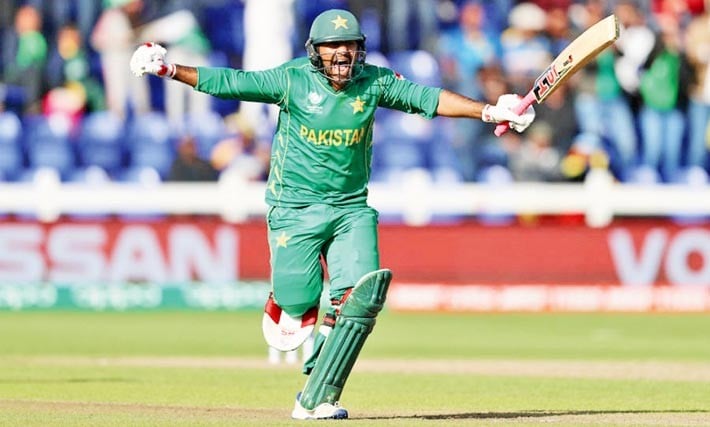
Sarfraz Ahmed lifted Pakistan’s T20 fortunes before captaining them to a maiden Champions Trophy crown last month. But can he keep on delivering in the long run?

On August 30 at Trent Bridge last year, Pakistan’s 50-over stocks touched rock bottom when England’s quartet of Alex Hales, Joe Root, Jos Buttler and Eoin Morgan toyed with their seemingly potent bowling attack on their way to a record total of 444. Hales belted 171 while Buttler struck England’s fastest ever fifty from just 22 balls against a Pakistan attack that was spearheaded by Mohammad Amir and included the likes of Wahab Riaz and Yasir Shah.
Pakistan could only manage 275 and suffered a 169-run defeat to concede the series after what was their third straight loss. One of the batsmen who did try to put up some sort of resistance was Sarfraz whose 38 was the second highest score in the Pakistan innings after Sharjeel Khan’s 30-ball 58.
That particular defeat marked the start of the end of Azhar Ali’s ODI captaincy. Sarfraz - the T20 captain - emerged as Pakistan’s best option to replace Azhar.
Sarfraz went on to take over the 50-over leadership from the opener and after having skippered Pakistan to the ICC Champions Trophy crown in England last month, he has also been installed as the Test captain. The wicketkeeper-batsman is now Pakistan’s skipper across all formats.
That’s a powerful position to have. It was a few years ago when Misbah-ul-Haq found himself in a similar situation but by then he didn’t have much time left in limited-overs cricket. At 30, Sarfraz is at the peak of his career. He could go on playing across all formats for five, or maybe, even more years.
He is certainly the right man at the right time for Pakistan. After the Champions Trophy triumph, many have been drawing comparisons with Imran Khan, the man who lead Pakistan to World Cup victory in 1992.
Sarfraz is no Imran. He isn’t the sort of charismatic leader, who can command respect due to the sheer weight of his personality. But that doesn’t make him a lesser captain. Sarfraz garners respect from his peers due to the sheer weight of his own performance, determination and sincerity. In fact it’s a good thing for the team that he isn’t a big crowd-pulling star. Shahid Afridi, the man from whom Sarfraz took over as T20 captain, was one such celebrity. When Afridi was captain, everything revolved around him. During his last few months as captain, Afridi wasn’t connected to the rest of his team as a captain should be. That was one of the reasons behind Pakistan’s slide in the T20 format under the command of Afridi.
Sarfraz is different. He is one of the guys. He doesn’t have any airs about him. There are no hordes of fans flanking him. He was put on the pedestal after the Champions Trophy victory but it remains highly unlikely that he would ever be worshipped by fans like they once worshipped Afridi. He isn’t built that way.
That too is good for Pakistan, a team that is in transformation. This team needed a leader with his feet firmly planted on the ground. This team needed a leader with his heart beating with the rest of his players. This team needed a leader with the sort of self-belief which Sarfraz exhibited even when the chips were down.
Sarfraz’s optimism is one of his greatest strengths. Back in 2015 when he was singled out by Waqar Younis, then Pakistan’s coach, Sarfraz proved himself to be a patient man who was strong enough to brave anything. It is common knowledge how Waqar treated Sarfraz during World Cup 2015. He didn’t play Sarfraz at the start of the tournament and threw him at the deep end by asking him to open against South Africa in a must-win game on a wet morning in Auckland. Sarfraz responded by winning that game for Pakistan.
Since then, Sarfraz has lifted Pakistan’s T20 fortunes and has skippered them to a maiden Champions Trophy crown. But can he keep on delivering in the long run?
Plenty could go wrong. Hopes are sky high after the stunning Champions Trophy victory. It’s not just that Sarfraz has captained Pakistan to a major 50-over title. It’s the manner in which he and his team have achieved it that has raised expectations. The emphatic win against India in the final was hailed as one of the greatest Pakistani victories of all time. But we should be clear about one thing. This Pakistan team is still a work in progress and expecting it to continue winning the way it did in England earlier this summer will be like expecting too much.
Pakistan will have to think long-term. The 2019 World Cup is two years away and should be the team’s main target. To make sure that Pakistan are able to raise a strong team for the World Cup our think-tank will have to find ways and means to beef up the squad. There are still various weak areas that need to be sorted out. There are still players like Wahab Riaz, Ahmed Shehzad and even Shoaib Malik and Mohammad Hafeez who have to justify their places in the line-up for an event like the World Cup. Pakistan will have to decide now whether they want to continue having faith in these players or whether they will be better off by adding more rookies like Fakhar Zaman in the squad. These are the sort of decisions which cannot be delayed. The clock is ticking.